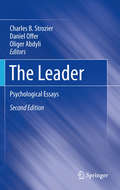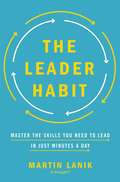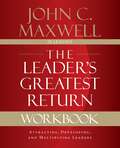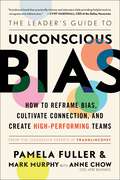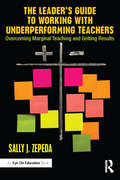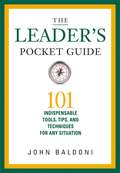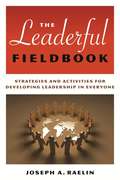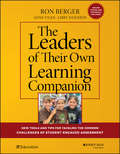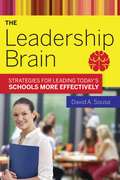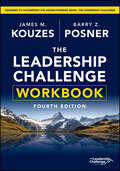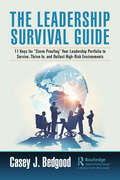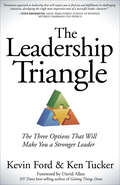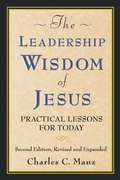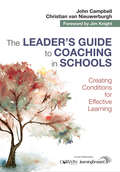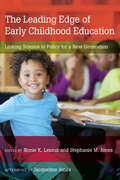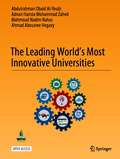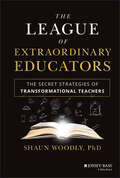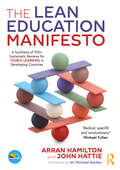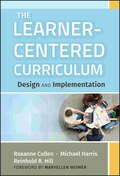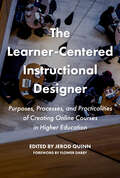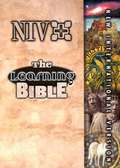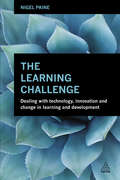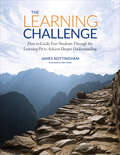- Table View
- List View
The Leader
by Charles B. Strozier Daniel Offer Oliger AbdyliThis volume examines the lives of prominent leaders from ancient Greece to the present. It explores how these leaders imposed their individual missions and mystiques on others, thereby fulfilling , and sometimes creating, distinct needs in their followers.
The Leader Habit: Master the Skills You Need to Lead--in Just Minutes a Day
by Martin LanikIn leadership as in life, only practice makes perfect. Habits are powerful, and The Leader Habit offers a simple, original approach to dramatically improving even our weakest areas.Routines quietly undergird large portions of what we do and how we function. Habit formation can speed success in the workplace as well--even in complex areas like leadership. Leadership training expert and bestselling author Martin Lanik spotlights 22 essential leadership abilities, breaking them down into a series of small, learnable behaviors.In The Leader Habit, you will find:Compelling evidence on how habits shape our lives, and how leadership is simply a series of habitsContent based on original research that looks at 795 leaders across the globe, identifying 22 essential leadership skills and 79 micro-behaviors that make up those skillsSimple exercises to turn effective leadership behaviors into ingrained habits, along with clear cues that tell you when to practice eachA Leader Habit Quiz that assesses 6 personality traits and points to behaviors that you&’ll find most rewardingTips for staying motivated, avoiding procrastination, and sustaining progressThe book's simple formula focuses on developing one skill at a time: sell the vision, delegate well, innovate often, empower others, overcome resistance, build strategic relationships, focus on customers, listen actively, negotiate effectively, and more.Many of us aspire to great leadership by consuming books and training. However, unless you intentionally reinforce the right behaviors, results are fleeting. The Leader Habit builds the "muscle memory" to turn leadership skills into lasting habits.
The Leader's Greatest Return Workbook: Attracting, Developing, and Multiplying Leaders
by John C. MaxwellWhat is the greatest return on a leader&’s time?After leaders have invested in their own leadership growth, what is the best way to accomplish their vision and grow their organizations and teams? Develop leaders! The more leaders an organization has and the better equipped they are to lead, the more successful the organization and all of its leaders.In this new workbook, based on the title of the same name, number one New York Times bestselling author John C. Maxwell takes the process of developing leaders to the next level by relating some of the key principles he has learned over the last quarter century as his organizations have developed millions of business, government, and non-profit leaders from every country around the world. He instructs leaders how to . . .Recognize potential leadersAttract leaders by creating a leadership &“table&”Work themselves out of a job by equipping and empowering leadersPosition leaders to build a winning teamCoach leaders to higher levels and make them leadership developers themselvesThis is where leaders really experience the compounding value of developing leaders and go to the highest levels of leadership themselves. The Leader&’s Greatest Return Workbook walks you through the process and helps you create a roadmap for success.Anyone who wants to take the next step in their leadership, build their organization or team today, and create their legacy for tomorrow needs to read The Leader&’s Greatest Return.Also available as a trade book.
The Leader's Guide to Unconscious Bias: How To Reframe Bias, Cultivate Connection, and Create High-Performing Teams
by Mark Murphy Pamela FullerA timely, must-have guide to understanding and overcoming bias in the workplace, from the experts at FranklinCovey. Unconscious bias affects everyone. It can look like the disappointment of an HR professional when a candidate for a new position asks about maternity leave. It can look like preferring the application of an Ivy League graduate over one from a state school. It can look like assuming a man is more entitled to speak in a meeting than his female junior colleague. Ideal for every manager who wants to understand and move past their own preconceived ideas, The Leader&’s Guide to Unconscious Bias explains that bias is the result of mental shortcuts, our likes and dislikes, and is a natural part of the human condition. And what we assume about each other and how we interact with one another has vast effects on our organizational success—especially in the workplace. Teaching you how to overcome unconscious bias, this book provides more than thirty unique tools, such as a prep worksheet and a list of ways to reframe your unconscious thoughts. According to the experts at FranklinCovey, your workplace can achieve its highest performance rate once you start to overcome your biases and allow your employees to be whole people. By recognizing bias, emphasizing empathy and curiosity, and making true understanding a priority in the workplace, we can unlock the potential of every person we encounter.
The Leader's Guide to Working with Underperforming Teachers: Overcoming Marginal Teaching and Getting Results
by Sally J ZepedaUnder increasing pressure in the face of teacher evaluation systems and accountability measures, schools must focus on those teachers that exhibit marginal to incompetent teaching behaviors in their classrooms. This book is a vital resource for educational leaders who are responsible for instructional programs and teacher evaluation. Zepeda’s tried-and-true strategies will help you take the necessary steps to support and mentor struggling teachers by detecting underperformance, developing strategies to help teachers, engaging in difficult conversations to enact plans of improvement, and following legal requirements. The practical tools found in this book will help teachers improve their instruction, assessment, classroom management, and teamwork.
The Leader's Guide to Working with Underperforming Teachers: Overcoming Marginal Teaching and Getting Results
by Sally J ZepedaUnder increasing pressure in the face of teacher evaluation systems and accountability measures, schools must focus on those teachers that exhibit marginal to incompetent teaching behaviors in their classrooms. This book is a vital resource for educational leaders who are responsible for instructional programs and teacher evaluation. Zepeda’s tried-and-true strategies will help you take the necessary steps to support and mentor struggling teachers by detecting underperformance, developing strategies to help teachers, engaging in difficult conversations to enact plans of improvement, and following legal requirements. The practical tools found in this book will help teachers improve their instruction, assessment, classroom management, and teamwork.
The Leader's Pocket Guide: 101 Indispensable Tools, Tips, and Techniques for Any Situation
by John BaldoniThe Leader’s Pocket Guide provides readers with on-the-job expertise to inspire and direct them on their professional journeys. Organized into three sections--self, colleagues, and organization--this useful guide spurs leaders to be ever growing in their careers, and includes lessons on major leadership concepts like why integrity should be your employees’ most highly valued trait, how to lead in a way that empowers others to manage, and why you should identify, commit to, and live by six words. With 101 indispensable tips and tools to explore, you’ll learn how to deliver inspiration, demonstrate character, develop confidence, communicate with authority, think critically, foster innovation, connect with others, resolve conflicts, add buzz to your leadership brand, coach for development, recognize achievement, instill company-wide purpose, and overcome adversity. Augmented by up-to-date research on the role of leaders and the expectations followers have for them, this pithy, powerful, and portable guide contains energizing action tips, clever formulas, self-assessments, and thoughtful places for deeper reflection to spur you toward becoming a top leader in your industry.
The Leaderful Fieldbook: Strategies and Activities for Developing Leadership in Everyone
by Joseph A. RaelinThe Global Economy-the flattened networked world-demands a new type of leadership: one that is collective and collaborative, where solutions and vision are co-created by everyone. Although generously depicted in the author's Creating Leaderful Organizations, the practical application of collective leadership remains a mystery to many practicing executives and managers.It is evident that the development of leaderful organizations cannot happen overnight; in fact, we need agents to emerge to help us learn how to change longstanding regressive organizational cultures into more leaderful communities. When we say leaderful, we refer to leadership practices that are collective and concurrent - people can serve as leaders all together and at the same time.This fieldbook is designed for these change agents - coaches, facilitators, OD consultants, and weavers - wishing to embark with their clients on a leaderful journey across a range of levels-from individual to network- and adopting a style of collective engagement that matches the democratic processes that they are seeking to produce. The Leaderful Fieldbook presents the most practical of recommendations in the form of an array of exercises that can be adopted immediately across these multiple levels of experience. It also features a set of cases that demonstrate the use of the exercises in each of these levels-individual, interpersonal, team, organizational, and social network.
The Leaders of Their Own Learning Companion: New Tools and Tips for Tackling the Common Challenges of Student-Engaged Assessment
by Ron Berger Libby Woodfin Anne VilenA New Companion to Leaders of Their Own Learning Puts Students in Charge of Their Learning and Growth Five years after the publication of Leaders of Their Own Learning, EL Education is back with a new companion guide to help you tackle the common challenges of student-engaged assessment. This unique, student-centered approach to assessment equips and compels students to understand goals for their learning and growth, track their progress toward those goals, and take responsibility for reaching them. EL Education has more than 25 years of experience supporting school transformation through student-engaged assessment. With their new book, The Leaders of Their Own Learning Companion, they have harvested the best tools and wisdom from schools across the country to help you hone student-led assessment practices in your classroom and school. Identifies the common challenges of implementing each of the eight interrelated student-engaged assessment practices from Leaders of Their Own Learning, and provides strategies and tools for tackling them Offers practical tips for school leaders Deepens your learning with 46 videos and an online toolbox The Leaders of Their Own Learning Companion is designed for teachers and leaders of all grade levels and no prior knowledge of the original Leaders of Their Own Learning is necessary to make the most of this book.
The Leadership Brain: Strategies for Leading Today?s Schools More Effectively
by David A. SousaCognitive neuroscientists are gaining greater insights into how the brain interacts with and learns from the environment. Now David A. Sousa, one of the foremost experts in translating this research into classroom practice, examines the brain-compatible leadership practices that sustain effective teaching and learning. The Leadership Brain provides a new model for a whole-brain approach to educational leadership. Examining what we know about the adult brain, and how to apply these lessons to effective school leadership and team management, this powerful resource provides you with the necessary tools to: Understand the differences in learning and retention, left and right hemispheric preferences, higher-order thinking, and the nature of creativity Initiate and lead productive change within your school Effectively shape and manage school culture Address the call for ethical and spiritual leadership Understand how thinking habits influence our actions, especially with problem solving and conflict resolution Reduce misconceptions about students with disabilities, gifted, and minority students Use information about the influence that modern society has on student learning and their different expectations The Leadership Brain includes valuable self-assessment tools, resources, and practical applications that will help instructional leaders develop a modern, creative, team-centered school where all students and teachers can reach their full potential.
The Leadership Challenge Workbook: Student Workbook And Personal Leadership Journal (J-b Leadership Challenge: Kouzes/posner Ser.)
by James M. Kouzes Barry Z. PosnerTHE LATEST EDITION OF THE GOLD STANDARD LEADERSHIP DEVELOPMENT FRAMEWORK The world’s best leaders consciously reflect on their own behaviors and choices in an effort to continuously better themselves. In the thoroughly revised and updated Fourth Edition of The Leadership Challenge Workbook, renowned leadership educators James M. Kouzes and Barry Z. Posner deliver their latest update to one of the world’s bestselling works on leading others in organizational settings. You’ll find practical guidance on how to apply the insights from The Leadership Challenge to your daily life, as well as hands-on tips for communicating your vision, strengthening workplace commitment, building employee trust, and maintaining worker satisfaction. Based on the insights of the Seventh Edition of James Kouzes and Barry Posner’s The Leadership Challenge, the hands-on experience of the Workbook engages you to examine and improve your ability to put into action The Five Practices of Exemplary Leadership®. The revised Fourth Edition of The Leadership Challenge Workbook will help leaders in every organization to make extraordinary things happen.
The Leadership Survival Guide: 11 Keys for "Storm Proofing" Your Leadership Portfolio to Survive, Thrive In, and Outlast High-Risk Environments
by Casey J. BedgoodCurrently, change is the new normal. As change grows, so does risk. But how will leaders understand the risk if they don’t measure it? In short, they won’t. The reality is that ignorance is never bliss. What leaders and their organizations don’t know will eventually impact them and their customers. Thus, situational awareness, forethought, and preparation are now key competencies for leaders to survive in high-risk environments. In this book, readers will learn the basics of leadership time management, the disruptability quotient, the leadership “canary” and why it’s just as important to leaders as it was to coal miners, and the slippery slope of change management (do we improve, change, or model the current state?), signals of leadership maturity and false positives, mastering the art of organizational knowledge, the pearls, and pitfalls of leadership rebranding, and the risk of non-utilized talent. Why aren’t current leaders required to undergo “storm proofing” from an operational perspective? As many of us experienced in various academic programs, the main foci are technical skills in management, organizational theory, data analysis, and many of the traditional leadership training courses. But, what happens when a leadership storm appears such as an unprecedented pandemic or supply chain crisis, or talent gaps where workers are not available to complete the basic services humanity relies on daily? Most leaders were not and are not prepared for today’s storms. The result is reactive leadership, higher-than-expected risk propositions, and disruptive transformations that force leaders from their perches to find the next best role their skillsets will buy. This book is for leaders and professionals who are currently, or will be leading teams, divisions, and organizations. Its purpose is to provide practical guidance on how leaders can “stormproof” their portfolios. Thus, they will be able to survive, thrive in, and outlast high-risk leadership storms that will overwhelm their less-prepared peers.
The Leadership Triangle: The Three Options That Will Make You a Stronger Leader
by Ken Tucker Kevin FordTired of leadership clichés? Ready to become a truly life-changing leader? In The Leadership Triangle, Kevin Ford and Ken Tucker explain the three types of challenges leaders face and the three options they have to choose from to confront these challenges, offering practical tools to help leaders from all walks of life. Weaving together innovative leadership principles and personal conversations with some of the world's greatest leaders in business and the nonprofit world, The Leadership Triangle will become a well-thumbed companion in your own leadership journey. You will learn how to recognize leadership challenges for what they really are, choose strategies based on the specific challenge you face, build incredible, high-functioning teams to overcome any challenge, and implement cutting-edge strategies and tools that will revolutionize the teams you lead.
The Leadership Wisdom of Jesus: Practical Lessons for Today
by Charles C. ManzThe Leadership Wisdom of Jesus provides practical leadership lessons at a time when religious-themed works like The Purpose-Driven Life have become increasingly popular.
The Leader′s Guide to Coaching in Schools: Creating Conditions for Effective Learning
by John Campbell Christian van NieuwerburghGrow your leadership skills to bring out the best in your school! Hallways, parking lots, staff rooms—these are all places where you and your staff have conversations every day. What if you could use these opportunities to build your staff’s resiliency and empower them to reach their goals. The Leader’s Guide to Coaching in Schools offers a proven, accessible, and usable framework to increase your interpersonal effectiveness and grow your ability to coach your staff to overcome obstacles and create their own solutions. Coaching experts John Campbell and Christian van Nieuwerburgh demonstrate how coaching is not just for formal coaching relationships, but how a coaching approach can be applied throughout a school day to create a culture of growth. Through sample questions, video examples, and tools this step-by-step guide shows you how to: Introduce a coaching approach into a wide range of conversational contexts Use the GROWTH coaching conversation framework to improve both staff and student success and well-being Use coaching approaches in areas that school leaders typically find challenging: in formal performance reviews, when giving informal feedback, and when working with teams Help your staff get "unstuck" no matter what challenges they are facing by using solutions-focused coaching techniques that help them envision desired outcomes and the actions needed to achieve them. "The GROWTH coaching model should be in every administrator’s hand as their bible for school improvement. Having this guide will guarantee success and getting the best out of all stakeholders." —Elizabeth Alvarez, Principal John C. Dore Elementary, Chicago, IL "The book is just what the doctor ordered for busy leaders—short and concise." —B.R. Jones, Superintendent of Education Tate County School District, Senatobio, MS
The Leader′s Guide to Coaching in Schools: Creating Conditions for Effective Learning
by John Campbell Christian van NieuwerburghGrow your leadership skills to bring out the best in your school! Hallways, parking lots, staff rooms—these are all places where you and your staff have conversations every day. What if you could use these opportunities to build your staff’s resiliency and empower them to reach their goals. The Leader’s Guide to Coaching in Schools offers a proven, accessible, and usable framework to increase your interpersonal effectiveness and grow your ability to coach your staff to overcome obstacles and create their own solutions. Coaching experts John Campbell and Christian van Nieuwerburgh demonstrate how coaching is not just for formal coaching relationships, but how a coaching approach can be applied throughout a school day to create a culture of growth. Through sample questions, video examples, and tools this step-by-step guide shows you how to: Introduce a coaching approach into a wide range of conversational contexts Use the GROWTH coaching conversation framework to improve both staff and student success and well-being Use coaching approaches in areas that school leaders typically find challenging: in formal performance reviews, when giving informal feedback, and when working with teams Help your staff get "unstuck" no matter what challenges they are facing by using solutions-focused coaching techniques that help them envision desired outcomes and the actions needed to achieve them. "The GROWTH coaching model should be in every administrator’s hand as their bible for school improvement. Having this guide will guarantee success and getting the best out of all stakeholders." —Elizabeth Alvarez, Principal John C. Dore Elementary, Chicago, IL "The book is just what the doctor ordered for busy leaders—short and concise." —B.R. Jones, Superintendent of Education Tate County School District, Senatobio, MS
The Leading Edge of Early Childhood Education: Linking Science to Policy for a New Generation
by Jacqueline JonesThe Leading Edge of Early Childhood Education aims to support the effort to simultaneously scale up and improve the quality of early childhood education by bringing together relevant insights from emerging research to provide guidance for this critical, fledgling field. It reflects the growing recognition that early childhood experiences have a powerful effect on children&’s later academic achievement and long-term life outcomes. Editors Nonie K. Lesaux and Stephanie M. Jones bring together an impressive array of scholarly contributors. Topics include: · creating learning environments that support children&’s cognitive and emotional development; · identifying and addressing early risk factors; · using data to guide educators&’ practice; and · capitalizing on the use of technology. Recent years have seen a surge of local, state, and national initiatives aimed at expanding and improving early childhood initiatives, particularly regarding access to preK programs. The Leading Edge of Early Childhood Education promises to be a valuable resource for those charged with enacting the next level of work in this critical area.
The Leading World’s Most Innovative Universities
by Abdulrahman Obaid AI-Youbi Adnan Hamza Zahed Mahmoud Nadim Nahas Ahmad Abousree HegazyThis open access book is unique in its contents. No other title in the book market has tackled this important subject. It introduces innovation as a way of practice for world-class universities. It, then, discusses the criteria for being innovative in the academic world. The book selects some of the top innovative world-class universities to study the factors that qualified them to be innovative, so that any other university can follow their steps to become innovative. The final chapter of the book presents some recommendations in this regard.
The League of Extraordinary Educators: The Secret Strategies of Transformational Teachers
by Shaun WoodlyDeliver on the promise of equity and transformational instruction in your classroomIn The League of Extraordinary Educators, veteran educator Dr. Shaun Woodly delivers a rousing narrative designed to take readers on a journey of empowerment, motivation, rich learning experiences, classroom synergy and even secrecy! You’ll learn how to transform teaching and learning through empowering connections at all levels in the classroom, saying goodbye to outdated, ineffective teaching practices and saying hello to instructional methods that authentically captivate students from diverse backgrounds.In the book, you’ll also find: Transformative practices that emerge from a combination of inspiration, mindset shifts, as well as practical techniques and strategies A focus on the importance of human connection, culturally significant learning experiences and community in the classroom A revolutionary story the reveals the secret strategies of transformational educations in urban and culturally diverse schools An indispensable resource for K-12 teachers, instructional staff, as well as leaders and administrators facing tough issues around creating meaningful learning experiences for students from underserved and underrepresented backgrounds, The League of Extraordinary Educators will set the stage for learning environments that authentically engage to create equitable academic outcomes for all students. All meaning all!
The Lean Education Manifesto: A Synthesis of 900+ Systematic Reviews for Visible Learning in Developing Countries
by John Hattie Arran HamiltonThe global expansion of education is one of the greatest successes of the modern era. More children have access to schooling and leave with higher levels of learning than at any time in history. However, 250 million+ children in developing countries are still not in school, and 600 million+ attend but get little out of it – a situation further exacerbated by the dislocations from COVID-19. In a context where education funding is stagnating and even declining, Arran Hamilton and John Hattie suggest that we need to start thinking Lean and explicitly look for ways of unlocking more from less. Drawing on data from 900+ systematic reviews of 53,000+ research studies – from the perspective of efficiency of impact – they controversially suggest that for low- and middle-income countries: Maybe pre-service initial teacher training programs could be significantly shortened and perhaps even stopped Maybe teachers need not have degree-level qualifications in the subjects they teach, and they might not really need degrees at all! Maybe the hours per week and years of schooling that each child receives could be significantly reduced, or at least not increased Maybe learners can be taught more effectively and less resource intensively in mixed-age classrooms, with peers tutoring one another Maybe different approaches to curriculum, instruction, and the length of the school day might be more cost-effective ways of driving up student achievement than hiring extra teachers, reducing class sizes, or building more classrooms Maybe school-based management, public–private partnerships, and performance-related pay are blind and expensive alleys that have limited influence or impact on what teachers actually do in classrooms. This groundbreaking and thought-provoking work also identifies a range of initiatives that are worth starting. It introduces the Leaning to G.O.L.D. methodology to support school and system leaders in selecting, implementing, and scaling those high-probability initiatives; and to rigorously de-implement those to be stopped. It is essential reading for anyone with an interest in education.
The Learner-Centered Curriculum
by Michael Harris Maryellen Weimer Roxanne Cullen Reinhold R. HillMost of the scholarship on learner-centeredness is focused on individual classroom pedagogy, but this book takes learner-centeredness beyond the classroom and asks academic leaders to consider the broader implications of making their institutions fully learner-centered. Systemic change is needed, and curriculum is at the heart of what higher education does. To truly effect change, the curriculum needs to be examined and aligned with learner-centered practices. In this book the authors offer both design specifications for a learner-centered approach to curriculum as well as practical recommendations for implementation and assessment. The book covers the need for redesigning curriculum, curriculum design in the instructional paradigm, learner-centered design in practice, implementation, program assessment (including a helpful rubric for this), innovating through technology, and learning spaces that support learner-centered curricula.
The Learner-Centered Instructional Designer: Purposes, Processes, and Practicalities of Creating Online Courses in Higher Education
by Flower Darby Jerod Quinn“What does a new instructional designer need to know to find her or his feet when working with faculty to create online classes?” This is a practical handbook for established and aspiring instructional designers in higher education, readers who may also be identified by such professional titles as educational developer, instructional technologist, or online learning specialist. Jerod Quinn, together with a team of experienced instructional designers who have worked extensively with a wide range of faculty on a multiplicity of online courses across all types of institutions, offer key guiding principles, insights and advice on how to develop productive and collegial partnerships with faculty to deliver courses that engage students and promote enduring learning.Designing and developing online classes for higher education takes a combination of pedagogical knowledge, the ability to build trust with faculty, familiarity with frameworks on how people learn, understanding of accessibility and inclusion, and technical skills to leverage a learning management system into an educational experience. Coming from diverse backgrounds, few instructional designers enter academia well versed in all of these aspects of creating online classes. This book provides the foundation on which instructional designers can build their careers. The guiding principle that animates this book is that the student experience and successful learning outcomes are paramount, and governs discussion of course design, pedagogy, the use of multimedia and technological advances, as well as the use of different forms of interactive exercises and group assignments. The succinct, informally written chapters offer ideas and means to apply theory to the daily work of instructional design and cover the four key components that drive this work in higher education: ·Defining the scope and main design approaches of our work·Building trust with the faculty we work with·Applying frameworks of how people learn·Mastering common online instructional practices.
The Learning Bible (New International Version)
by American Bible SocietySince the publication of "The Learning Bible"--a full-color, easy-to-use and fun-to-read study Bible--the American Bible Society has been working on an NIV version, which is available this spring. With hundreds of charts, maps, and full-color photos and illustrations, this new Bible is sure to be a bestseller.
The Learning Challenge
by Nigel PaineThe landscape of workplace learning is transforming. Organizations today understand that formal training is not always the best solution in the fast changing world of innovation and new technology. The rise of social and informal learning, gamification of training, dealing with big data and working with extended enterprise are just some challenges L&D professionals face in their work today. The Learning Challenge helps practitioners to make sense of the latest developments in this area and the impact they have on the learning function in their organization. With the help of case studies and interviews from a range of high profile practitioners, The Learning Challenge defines the role the new learning leader and illuminates the practical implications for creating and implementing a learning strategy for the 21st century.
The Learning Challenge: How to Guide Your Students Through the Learning Pit to Achieve Deeper Understanding (Corwin Teaching Essentials)
by James A. NottinghamEmbrace challenge and celebrate Eureka! Challenge makes learning more interesting. That’s one of the reasons to encourage your students to dive into the learning pit—a state of cognitive conflict that forces students to think more deeply, critically, and strategically until they discover their “eureka” moment. Nottingham, an internationally known author and consultant, will show you how to promote challenge, dialogue, and a growth mindset through: Practical strategies that guide students through the four stages of the Learning Challenge Engaging lesson plan ideas and classroom activities Inspiring examples from Learning Challenges across the world
